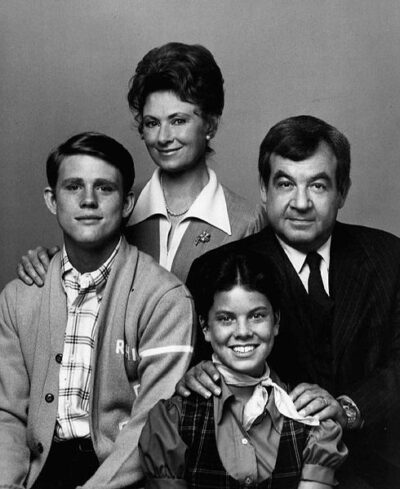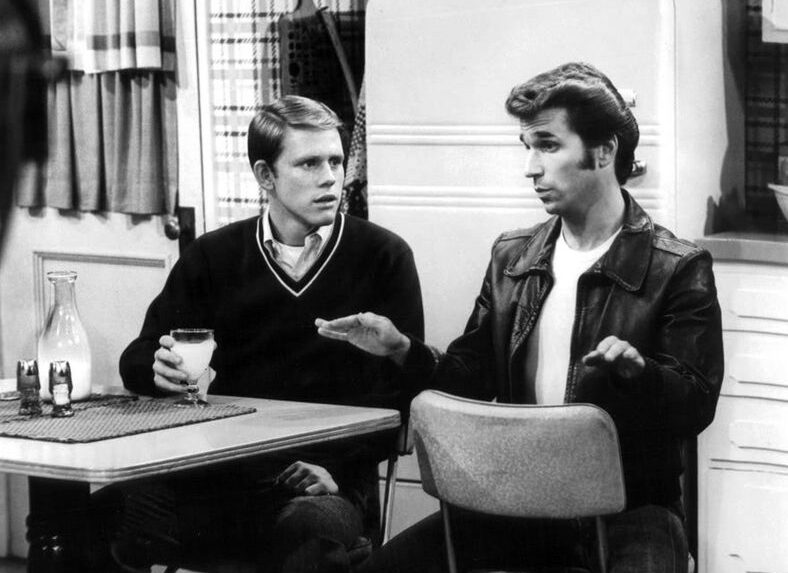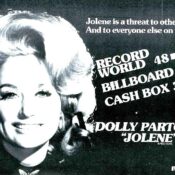The prevailing theory used to be that a culture’s cycle of nostalgia turned every 20 years. Recently, the cycle seems to be breaking down; due to the omnipresence of online media, every kind of music and movie from the past is available everywhere all at once. But 50 years ago, the primary means of mass communication was still television, and one new show settled quite comfortably into fondly reminiscing about 20 years earlier. That show was Happy Days.
In a roundabout way, Happy Days partially owed its existence to a successful 1973 film about early ’60s nostalgia, George Lucas’s American Graffiti. Lucas connected to the experience of youth by centering his coming-of-age story not in the present, but in 1962. He also perceived that the cruising culture the film would celebrate was waning, so it would make the movie both a nostalgia piece and, hopefully, something that would also appeal to a younger audience.
One of the key casting decisions was Lucas’s choice of Ron Howard as Steve. Howard was well known thanks to his lengthy run as Opie on The Andy Griffith Show. However, Howard had already played a teen from an earlier decade, Richie Cunningham, in an unsold pilot from producer, director, and writer Garry Marshall; that pilot became an episode of the anthology series Love, American Style titled “Love and the Television Set.” It was that episode that convinced Lucas to cast Howard. When Graffiti became a hit, ABC decided to turn the Love, American Style episode into an ongoing series, Happy Days, using Howard and his connection to the film as part of the draw.

Marshall reconvened several cast members from the pilot for the series. Marion Ross had played Richie’s mom, Marion Cunningham, and Anson Williams had played Richie’s friend, Potsie Weber. Richie’s father, Howard Cunningham, was originally played by Harold Gould in the pilot, but Gould wanted to do another project; instead, Tom Bosley took on the role. Several other characters who would later be promoted to the main cast began in recurring roles in the first season, including Richie’s sister Joanie (Erin Moran), Richie’s friend Ralph Malph (Donny Most), and, of course, Henry Winkler’s Arthur “Fonzie/The Fonz” Fonzarelli.
One of the more hilarious bits of Hollywood lore comes from a final recurring character who appeared in the first two seasons. Chuck Cunningham (initially played by Gavan O’Herlihy before being replaced by Randolph Roberts) was Richie and Joanie’s older brother. Chuck was a decidedly minor character, usually appearing in scenes to just disappear to his room or play basketball. By season two, the character was shuffled out and never mentioned again. In fact, the show totally ignored his existence from that point on, going so far as to have Howard and Marion mention that they had only two children on several occasions. The vanishing birthed the term “Chuck Cunningham Syndrome,” which is applied to characters, particularly major family members, disappearing with no explanation (other examples include Family Matters’ Judy Winslow and The King of Queens, where leads Doug and Carrie both had siblings who vanished, as well as no fewer than three disappearing dogs).
Bill Haley & His Comets perform “Rock Around the Clock” (Uploaded to YouTube by The Ed Sullivan Show)
In keeping with the ’50s tone of the show, the theme song for the first two seasons was a re-recorded version of the Bill Haley & His Comets classic, “Rock Around the Clock,” performed by the original group. Its use in the show put it back on the charts. There’s actually some confusion about the theme for season two as, due to a music rights issue, syndicated broadcasts have frequently substituted in the song that would be the theme for the rest of the show’s run, the eponymous “Happy Days.” “Happy Days” originally appeared as the show’s closing theme with different lyrics; by season three, it would get moved up front (and continue as the closing). The TV version had Jim Haas singing lead; a single version by Pratt & McClain went to #5 on the Billboard charts in 1976.
In the beginning, the show was firmly focused on Richie and his friends. Richie would often get advice from The Fonz; frequently it was about dating, but Fonzie was willing to hold court on most matters and occasionally get the guys out of jams. It wasn’t long before the Richie/Fonz dynamic became the central piece of the show, with Winkler’s performance making his funny and charismatic catch-phrase machine a true breakout character. When the second season rolled around, Winkler had leaped to the top of the credits. While Ron Howard has admitted that it caused him some personal consternation at the time, primarily from how executives treated him, he and Winkler have remained lifelong friends, and Winkler is the godfather of all four of Howard’s children.
Ron Howard on his co-stars (Uploaded to YouTube by FoundationINTERVIEWS)
Happy Days was instantly popular, but it became the most-watched show in America with the fourth season, airing from September of 1976 through March of 1977. The Fonz was a legitimate pop culture phenomenon, adorning T-shirts and lunch boxes and even earning a Mego action figure with “thumbs-up” action. The show stayed in the Nielsen Top Five through 1979 and remained in the Top 20 through 1982.
It also became a launching ground for young talent, giving actors like Penny Marshall, Tom Hanks, and Robin Williams early wide exposure to the American audience. The show also became something of a spin-off factory, producing hits like Laverne & Shirley and Mork & Mindy and lesser-known shows like Blanksy’s Beauties and Out of the Blue. There were also two animated spin-offs: The Fonz and the Happy Days Gang and Laverne & Shirley with The Fonz.
Another spin-off would prove to be something of a problem for the series. Howard had departed to pursue his extremely successful directing career after the seventh season, and more of the show’s non-Fonz focus shifted to his younger sister, Joanie, and her boyfriend, Fonzie’s cousin Chachie (Scott Baio). The Joanie and Chachi pairing was popular, and they were spun off into Joanie Loves Chachi in 1982. Happy Days itself slipped in the ratings as the popular characters had moved to their own program. The new show was initially a hit, but cratered in its second season after a timeslot move; it was canceled and the characters returned to the main series. Flooded with new characters and lacking focus, Happy Days slipped to #28 in the ratings.
Henry Winkler on how Fonzie spoke (Uploaded to YouTube by FoundationINTERVIEWS)
The eleventh season in 1983-1984 would be the show’s last. The series was given the opportunity to produce a one-hour finale that centered on Joanie and Chachi’s wedding. Oddly, though it was the finale, a few episodes from earlier in the season that hadn’t been shown in proper order aired during the following summer. So while the finale aired on May 8, 1984, five more previously unseen episodes were burned off over the next few months. Regardless, Happy Days enjoyed one of the longest runs of any sitcom on ABC.
After Happy Days, a number of original and later cast members went on to successful endeavors. The most obvious example would be Howard, Winkler, and Williams. Howard continues to direct hit films like Splash!, A Beautiful Mind, and The DaVinci Code. Winkler has remained a constant acting presence, most recently drawing much acclaim for his role in HBO’s Barry. Anson Williams became a very busy television director, helming episodes of everything from L.A. Law to Baywatch.
While the show did run endlessly in syndication for years, it’s now a little harder to find. Only the first six seasons have been released on DVD, and various streamers with episodes (including Amazon Prime, Paramount+, PlutoTV, YouTube, and others) don’t have the complete series, or even complete seasons. A good portion of this is owed to music rights issues; on several episodes of the DVD releases, replacement songs were inserted to get around those issues. But for the moment, there appears to be no one place where one can catch the entirety of the show.
Despite the difficulty finding all of the shows today, Happy Days retains a strong place in the hearts of fans and critics alike. It managed to reflect the 1950s while becoming an inextricable part of 1970s culture. The episode “Hollywood, Part 3” in season five led to Jon Hein coining the phrase “Jumping the shark” to describe shows that had gone a little bonkers. Nevertheless, its popularity endures: as recently as December of 2023, Variety ranked it in its list of the 100 Greatest TV Shows. Not too bad for nostalgia.
Become a Saturday Evening Post member and enjoy unlimited access. Subscribe now


Comments
What!!??? This aging thing is getting to me! Not only did I live through the ’50s of Happy days, you are now telling me that “Happy Days is 50 years old” OMG!! I suspect that I will be jumping the shark any day now – #@$%^*#@
The whole ’50s nostalgia craze seemed to really be lit in 1972 with ‘Grease’ on Broadway, cover stories in both LIFE and Newsweek on the decade that year, ‘Love and the Television Set’, then ‘Graffiti’ in ’73 and ‘Happy Days’ in ’74. Meanwhile, the 1920’s, ’30s and ’40s were well represented in film during the painful ’73-’74 Watergate era also.
The ’50s though, lasted throughout the entire decade, because that was the decade the ’70s wanted to BE more than anything. After the disastrous late ’60s of more assassinations, the nightly soldier body counts of the undeclared Vietnam “War” the U.S. had NO business being in, riots, hippies, drug culture, a music festival in the mud, the Manson Murders, and more, is it any wonder all this, in such a short period of time, would set the stage for the Fifties II?!
Indeed, just weeks after ‘Happy Days’ premiered, the Patricia Hearst ordeal began, so the timing really was perfect. It was a product of its time with the catch-phrases, but Winkler’s never got on my nerves like Jimmie Walker’s on ‘Good Times’ and later ‘Kotter’ which I never liked anyway. ‘The Fonz’ really made the show, and without ‘Happy Days’ there wouldn’t have been ‘Laverne & Shirley’.
Creatively, the show ran too long; but it’s hard to pull the plug on a show still in the Top 20. I watched it pretty regularly into 1979, but by then preferred the always-based-on-a-misunderstanding “Three’s Company”. Without the gifted Henry Winkler, we likely never would have had the brilliant original (only) “MacGyver from 1985-’92. Thank you for the YT links, Troy.
“Happy Days” was a great show and perfect for the time. It’s too bad shows like that exist no longer. As someone whose teen years were spent in the 1970s, I remember fondly the 50s music being broadcast, usually later in the evening from popular rock AM radio stations. It’s amusing to me nowadays that teenagers at the high school where I serve as a substitute teacher admire the music of the 1970s and late 1960s and are eager to ask me to tell them what it was like (what I did) back “in my day.” Today, we are the “oldies but goodies” in their eyes.